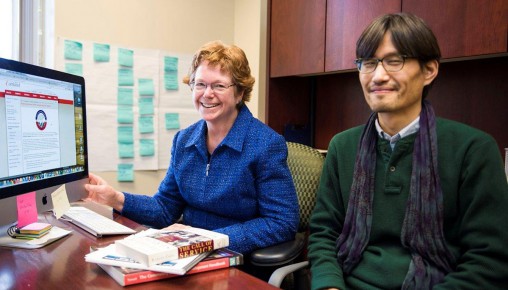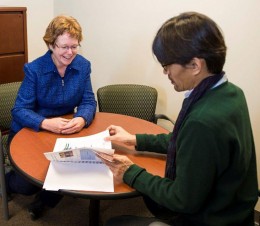
Marjorie McLellan, interim director of service-learning and civic engagement, left, and Hee-Young Shin, assistant professor of economics, are leading Wright State’s participation in a national initiative researching the impact economic inequality has on democracy.
Teaching students to be soldiers of economic equality.
That’s the mission of an ambitious national educational initiative. And Wright State University is a key player.
The American Association of Colleges and Universities’ American Democracy Project/The Democracy Commitment is a three-year initiative on economic inequality led by Keene State College in New Hampshire and Mount Wachusett Community College in Massachusetts. Wright State, which is collaborating with Sinclair Community College, is one of about 30 universities participating.
“The goals of higher education are to make a difference, to effect change, to improve things,” said Marjorie McLellan, interim director of service-learning and civic engagement at Wright State. “If people carry a sense of hope and confidence, they can do something about economic inequality. And if we give them the knowledge and skills to do something about it, we’ve done a really good job.”
Between 1979 and 2007, wages for the top 1 percent of American workers rose nearly 10 times as fast as those for the bottom 90 percent.
The mission of the initiative is to research the dimensions of economic inequality to better understand its impact on democracy. The long-term goal is to help students think about and take action to confront the complex causes of economic inequality and prepare to live lives of informed civic engagement.
McLellan said studies show that Dayton ranks poorly among cities when it comes to childhood hunger.
“I think that is symbolic of the economic issues we confront in the region and some of the challenges many families, individuals and children face,” she said. “This is a chance for us to address economic inequality, in partnership with other organizations that serve real needs.”
The participating universities are being asked to develop courses across different disciplines blended with the teaching of economic inequality.
“You could take a unit or a number of units and use them in a particular course or you could design a whole course around it,” McLellan said.

As part of the American Democracy Project/The Democracy Commitment, Wright State will develop courses across different disciplines blended with the teaching of economic inequality and create student service-learning and research opportunities.
The universities are also being asked to create student activities and student service-learning and research opportunities. Research results are to be shared in workshops and publications.
Although unrelated to the initiative, previous research projects at Wright State have included helping Dayton Metro Libraries determine what kinds of programs and resources are needed at new library branches in low-income neighborhoods; and doing strategic planning for the Greater Dayton Volunteer Lawyers Project, which serves low-wealth clients in legal cases that are not covered by public defenders such as foreclosures.
Hee-Young Shin, assistant professor of economics, recently returned from the initiative’s planning meeting in Washington, D.C. He met with representatives of the other universities, who shared their ideas.
Ideas included studying inequality through literature and film, developing financial literacy courses, creating mock legislatures to discuss economic inequality and holding hunger banquets, alternative spring-break activities and regional poverty symposiums.
Shin plans to introduce the element of economic inequality in some of his classes. He may have his students watch documentary films on the issue and write essays about them. And he hopes to conduct statistical research that would produce an economic and income profile of Dayton and Ohio.
McLellan said many Wright State students themselves deal with economic inequality.
“Many of our students struggle to go to college,” she said. “Many of our students are working jobs outside of school. They are supporting families.”
Economic inequality education can be applied in more than just careers in social work or urban affairs, McLellan said.
“Students may be going on to careers in corporations. Corporate social responsibility is a growing area of importance. Businesses want to have an impact on their communities,” she said. “And if you are a chemist doing environmental chemistry, economic inequality impacts where there are problems in the environment.”
McLellan hopes the initiative also spurs discussion in the community about economic inequality.
“The answer isn’t always about throwing money at the problem; sometimes it’s about putting effort and thought in different places,” she said.
McLellan said instrumental to the initiative was support from Kimberly Barrett, vice president for multicultural affairs and community engagement; Thomas Sudkamp, vice president for curriculum and instruction; and Kristin Sobolik, dean of the College of Liberal Arts. Wright State’s effort is funded by COLA, the Division of Multicultural Affairs and Community Engagement and the Division of Curriculum and Instruction.
“The university has really gotten behind the mission,” McLellan said. “This is a very committed campus to transforming communities.”
Wright State is engaged in a $150 million fundraising campaign that promises to further elevate the school’s prominence by expanding scholarships, attracting more top-flight faculty and supporting construction of state-of-the-art facilities. Led by Academy Award-winning actor Tom Hanks and Amanda Wright Lane, great grandniece of university namesakes Wilbur and Orville Wright, the campaign has raised more than $110 million so far.

 Glowing grad
Glowing grad  Wright State’s Homecoming Week features block party-inspired events Feb. 4–7 on the Dayton Campus
Wright State’s Homecoming Week features block party-inspired events Feb. 4–7 on the Dayton Campus  Wright State music professor honored with Ohio’s top music education service award
Wright State music professor honored with Ohio’s top music education service award  Wright State’s Industrial and Human Factors Engineering program named one of top online graduate programs by U.S. News
Wright State’s Industrial and Human Factors Engineering program named one of top online graduate programs by U.S. News  Student-run ReyRey Café celebrates decade of entrepreneurship at Wright State
Student-run ReyRey Café celebrates decade of entrepreneurship at Wright State 